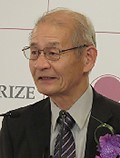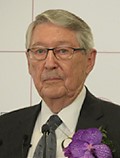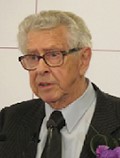News
2018 Japan Prize Winners Announced Updated in March 2018
For its 34th round of Japan Prize (2018), Japan Prize Foundation decided on three recipients. The foundation selected Dr. Akira Yoshino of Japan (currently Honorary Fellow at Asahi Kasei Corporation and Professor at Meijo University) for his accomplishments in developing lithium-ion battery used in daily electronic devices like smartphones. Furthermore, one researcher from the United States and another from Australia were selected for discovering two types of lymphocytes which have significant functions in our bodies. The foundation announced this news in the afternoon of January 30 at a press conference in Tokyo. The award ceremony will be held in Tokyo on April 18.
Dr. Yoshino received his award under the Resources, Energy, Environment and Social Infrastructure field for the “Development of lithium ion batteries.” After completing his degree at the Graduate School of Engineering at Kyoto University in 1972, Dr. Yoshino used utilized lithium cobaltate and carbon material as electrodes in the early 1980s. He was able to verify that lithium ions travel back and forth between the electrodes to function as battery. He established the prototype of lithium ion battery and filed patent in 1985. It was put into practical use by Asahi Kasei and others in 1991. Lithium ion batteries are compact, have a large capacity, and are rechargeable. They are widely used in mobile devices like laptops, smartphones, digital cameras, portable music players and electric cars.
During the press conference, Dr. Yoshino expressed his joy of being one of the awardees: “Today is in fact my 70th birthday, a rare commemorative age for long life in east Asia. In my family, there is a saying that something great will happen on one’s 70th birthday and it really turned out to be true. Many researchers have been involved in the development of ion batteries. I believe many young researchers will create wonderful innovation as a result of this prize.” Dr. Yoshino is also expected to be a candidate for the Nobel Prize in Chemistry.
In addition to Dr. Yoshino, Professor Max Cooper of Emory University School of Medicine (U.S.) and Professor Emeritus Jacques Miller from Walter and Eliza Hall Institute of Medical Research (Australia) were selected for the “Discovery of B lymphocyte and T lymphocyte lineages and its impact on understanding disease pathology and therapeutic development.”
Dr. Miller and Dr. Cooper had vigorously pioneered the study of molecular biology since early 1960s and reveal the presence of B lymphocytes and T lymphocytes, which are the two major lineages responsible for immunity against foreign substances that enter the body. The foundation announced that “their accomplishments as forerunners in the field had laid the foundation for basic and applied research in immunology for the second half of this century. High-profile cancer drugs and medication for immune diseases were possible because of their discoveries.”

Photos courtesy of Japan Science and Technology Agency

Photos courtesy of Japan Science and Technology Agency

Photos courtesy of Japan Science and Technology Agency







